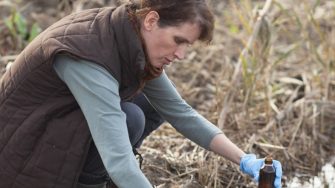
Overview
The UNSW Environmental Geophysics (GEOS6733) course is open to both undergraduate and postgraduate students. The course aims to provide you with the necessary skills and theory to undertake geophysical measurements of air, water, vegetation, soil and rock. These skills are often required in research and consulting environments in hydrology, hydrogeology, climatology and environmental sciences.
With modern civilisations at risk from natural geophysical events, environmental geophysicists are in high demand to address socio-economic and environmental factors. You’ll study the theory behind various environmental geophysical methods and get hands-on experience with geophysical techniques that involve data processing and analysis.
Specific methods include:
- weather station design and hydrology measurements using acoustic drip loggers
- infra-red measurements of soil and atmospheric carbon dioxide concentrations
- x-ray fluorescence analysis of soil mineral properties
- optical geophysics, using fluorescence and absorbance, to measure river organic matter water quality
- cavity-ringdown and off-axis mass spectrometry measurements for mapping methane and carbon dioxide processes in the landscape.
Course attendance:
- In person.
- Short/intensive course.
Level:
- Postgraduate.
- Undergraduate - Third Year.
Discipline:
- Climate science.
- Earth science.
- Geography.
Course code: GEOS6733 (GEOS3733 is no longer in use)
Course breakdown
At the conclusion of this course, you’ll be able to:
- understand the theory behind a wide range of field environmental geophysical techniques
- apply these theories to the field application of the techniques
- undertake analysis of field data
- create reports and presentations based on the theory and application of the techniques.
Conditions for enrolment
Environmental Geophysics primarily caters for third-year honours and postgraduate students. Earth’s Interconnections (GEOS2291) provides excellent preparation for this course but is not a pre-requisite.
Career opportunities
This course aims to provide laboratory and field data collection and analysis skills required in research and consulting environments hydrology, hydrogeology, climatology and environment sciences. At UNSW Science, you can study the Bachelor of Environmental Management or further specialise in this field with our honours program.
Relevant roles
- Geologist
- Geophysicist
- Hydrologist
- Environmental scientist
- Natural resource manager
- Environmental scientist
What our graduates say
“As daunting as Environmental Geophysics may sound, a mix of undergraduate and postgraduate students signed up for an intensive four-day field. We had arrived at the Wellington Caves, a cave system which still holds evidence of the 2.8t wombat like creature (Diprotodon) that roamed the surface up to some 46 000 years ago. Although we weren’t there to look at bones, we were interested in the caves groundwater system and how this impacts the Bell River, which is one of the main water sources for the area.
Day one involved course theory and included all the mechanics behind the geophysical instruments and what we were going to be doing for the next few days, before splitting up into groups to prepare for the week.“
- Gurinder Nagra, BSc Advanced Science
